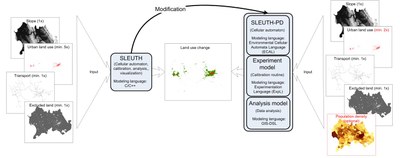Modeling with domain-specific languages
Using domain-specific languages for modification and reuse of a well-established cellular automata model to model urban growth
(German: Modifikation und Wiederverwendung eines existierenden zellulären Automata-Modells zur Modellierung der Urbanisierung in Albanien; Entwicklung und Anwendung eines Ansatzes gekoppelter domain-specific languages).
Sophisticated computer-based land use modeling seems to be state of the art in land system science, however, very often well-established models such as the cellular automata urban land development model SLEUTH have been developed for a specific aim, study area, data availability and are technology bound. A transfer to another system is frequently limited by the black box character of a model and exploring an established model in its complexity is a very time- and cost-intensive effort for environmental and land system scientists. Therefore, major challenges in recent land use modeling experiments appear when a) a model is transferred to another case study, b) meta-information on the modeling experiment is needed, and c) modifications of a model are envisaged. New approaches to the development of domain-specific modeling languages (DSLs) and experiment management tools in the Informatics domain may offer new perspectives for modeling land use change. The aim of this project is to develop a DSL-based approach and test it with the well-established cellular automata model SLEUTH for modeling urban dynamics in Tirana, Albania.

Principal Investigators:
Tobia Lakes (Geomatics Lab, Geography Department, Humboldt-Universität zu Berlin)
Falko Theisselmann (Deutsches GeoForschungsZentrum GFZ)
Project Investigators:
Joachim Fischer (Institute for Computer Science, Humboldt-Universität zu Berlin)
Frank Kühnlenz (Institute for Computer Science, Humboldt-Universität zu Berlin)
Funding:
METRIK - Postgraduate study programme supported by Deutsche Forschungsgemeinschaft (DFG)
